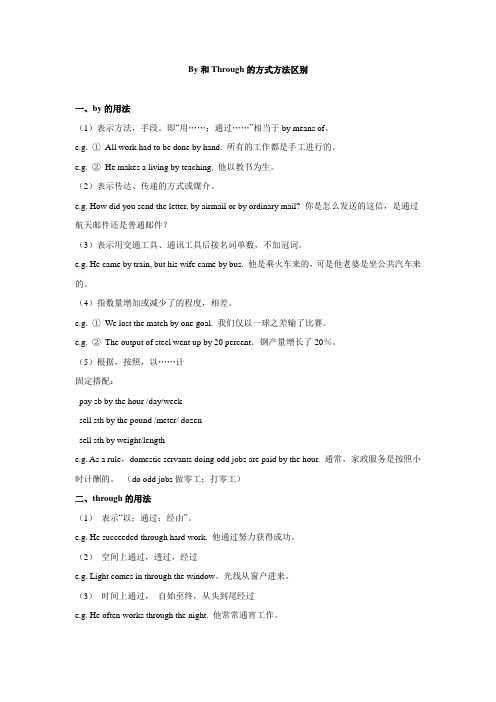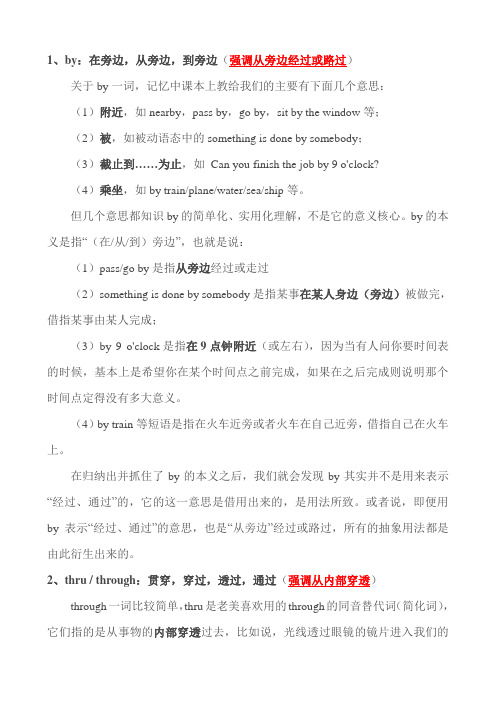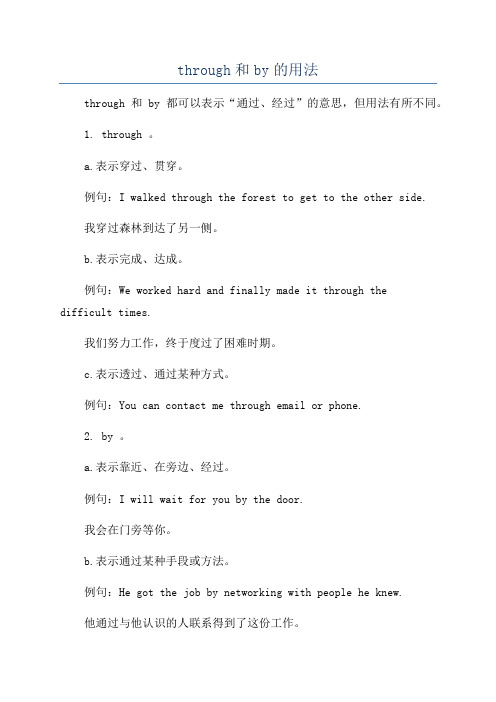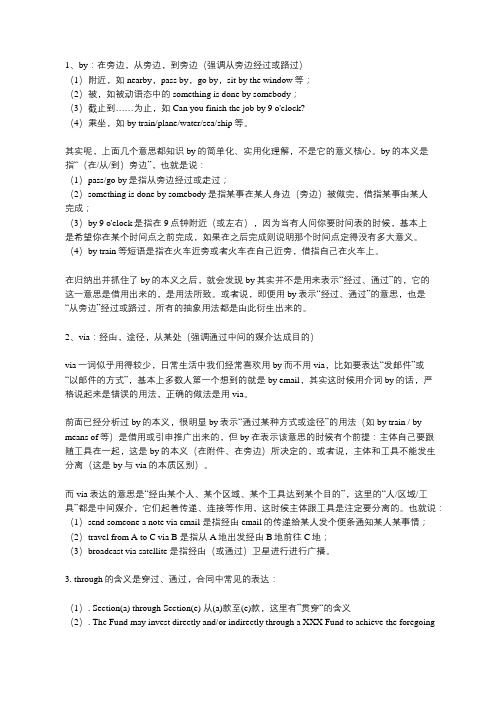by与through的区别
By和Through的方式方法区别

By和Through的方式方法区别一、by的用法(1)表示方法,手段。
即“用……;通过……”相当于by means of。
e.g. ①All work had to be done by hand. 所有的工作都是手工进行的。
e.g. ②He makes a living by teaching. 他以教书为生。
(2)表示传达、传递的方式或煤介。
e.g. How did you send the letter, by airmail or by ordinary mail? 你是怎么发送的这信,是通过航天邮件还是普通邮件?(3)表示用交通工具、通讯工具后接名词单数,不加冠词。
e.g. He came by train, but his wife came by bus. 他是乘火车来的,可是他老婆是坐公共汽车来的。
(4)指数量增加或减少了的程度,相差。
e.g. ①We lost the match by one goal. 我们仅以一球之差输了比赛。
e.g. ②The output of steel went up by 20 percent.钢产量增长了20%。
(5)根据,按照,以……计固定搭配:pay sb by the hour /day/weeksell sth by the pound /meter/ dozensell sth by weight/lengthe.g. As a rule,domestic servants doing odd jobs are paid by the hour. 通常,家政服务是按照小时计酬的。
(do odd jobs做零工;打零工)二、through的用法(1)表示“以;通过;经由”。
e.g. He succeeded through hard work. 他通过努力获得成功。
(2)空间上通过,透过,经过e.g. Light comes in through the window。
by, through和via之间的区别

by, through和via之间的区别by, through, via这三个词都有“通过”的含义,但是区别很大,以下我会详细分析这三个词各自的用法和区别:1 by,我们通常会见到以下六种用法:1. 表示附近,例如nearby,pass by,go by,sit by the window等;2. 表示由某人做某事,例如The name of the Company is “XXX” or such other name or names as may be designated by Management Board;3. 表示截止到……为止,例如by the year of......;4. 表示乘坐某种交通工具,例如by train/plane/sea/ship/air等;5.表示通过某种方式,例如by means of, by email等;6.表示原因,例如by reason of。
2 through的含义是穿过、通过,合同中常见的表达:1. Section(a) through Section(e) 从(a)款至(e)款,这里有”贯穿“的含义2. The Fund may invest directly and/or indirectly through a XXX Fund to achieve the foregoing goals. 基金可通过XXX基金直接和/或间接进行投资,以实现前述目标。
3.through friendly negotiation 通过友好协商3 via表达的意思是“经由某个人、某个区域、某个工具达到某个目的”,这里的“人/区域/工具”都是中间媒介,它们起着传递、连接等作用。
其含义主要有两层:(1)经由......中转;(2)通过;凭借,常见句型:1. I sent a message to Mary via her friend. 通过Mary的朋友带信给她;2. He flew to New York via Hong Kong. 他经由香港飞往纽约;3. broadcast via satellite 通过卫星广播。
By,Through与With辨析(withbythrough区别)

By,Through与With辨析(withbythrough区别)By,Through与With辨析(with by through 区别)By,Through与With辨析by, through和with这三个介词都可表示完成某事的方法、力量、手段及媒介。
但在用法上却有一些重要区别。
1. by通常直接介绍发生作用或影响的动因——即:(1)表达什么人、什么作用(或力量)造成了某种结果;(2)表达我们做了什么事以取得预期的结果,用法上常与动名词搭配。
如:The streets are lighted by electricity.街道用电照明。
The church was designed by Wren.这座教堂是Wren设计的。
He makes a living by teaching.他靠教书为生。
By adding or changing a suffix,we can change a word from one class to another.通过增加或改变后缀,可以改变一个词的词性。
此外,by还常用来指交通工具(如by bus. by car. by train等)。
2. through介绍的对象比较间接——(1)常与指人或物的名词一起使用,表示媒介;(2)其后接说明条件或状态的名词及动名词,表示事情发生的原因或方式。
例如:I learned of the position through a newspaper advertisement.我从一则报纸的厂告获知这个职位。
We heard about it through some friends.我们从一些朋友们那里听说此事。
The war was lost through bad organization.由于组织不当,战争失败了。
We lost ourselves through not knowing the way.我们因不认识路而迷失了。
at, in, on, by和through在表示时间上的区别

at, in, on, by和through在表示时间上的区别1. at指时间表示:(1)时间的一点、时刻等。
如:They came home at sunrise (at noon, at midnight, at ten o’clock, at daybreak, at dawn). (2)较短暂的一段时间。
可指某个节日或被认为是一年中标志大事的日子。
如:He went home at Christmas (at New Year, at the Spring Festival, at night).2. in指时间表示:(1)在某个较长的时间(如世纪、朝代、年、月、季节以及泛指的上午、下午或傍晚等)内。
如:in 2004, in March, in spring, in the morning, in the evening, etc(2)在一段时间之后。
一般情况下,用于将来时,谓语动词为瞬间动词,意为“在……以后”。
如:He will arrive in two hours.谓语动词为延续性动词时,in意为“在……以内”。
如:These products will be produced in a month.注意:after用于将来时间也指一段时间之后,但其后的时间是“一点”,而不是“一段”。
如:He will arrive after two o’clock.3. on指时间表示:(1)具体的时日和一个特定的时间,如某日、某节日、星期几等。
如:On Christmas Day(On May 4th), there will be a celebration.(2)在某个特定的早晨、下午或晚上。
如:He arrived at 10 o’clock on the night of the 5th.(3)准时,按时。
如:If the train should be on time, I should reach home before dark.4. by指时间表示:(1)不迟于,在(某时)前。
by、via、through的区别

1、by:在旁边,从旁边,到旁边(强调从旁边经过或路过)关于by一词,记忆中课本上教给我们的主要有下面几个意思:(1)附近,如nearby,pass by,go by,sit by the window等;(2)被,如被动语态中的something is done by somebody;(3)截止到……为止,如Can you finish the job by 9 o'clock?(4)乘坐,如by train/plane/water/sea/ship等。
但几个意思都知识by的简单化、实用化理解,不是它的意义核心。
by的本义是指“(在/从/到)旁边”,也就是说:(1)pass/go by是指从旁边经过或走过(2)something is done by somebody是指某事在某人身边(旁边)被做完,借指某事由某人完成;(3)by 9 o'clock是指在9点钟附近(或左右),因为当有人问你要时间表的时候,基本上是希望你在某个时间点之前完成,如果在之后完成则说明那个时间点定得没有多大意义。
(4)by train等短语是指在火车近旁或者火车在自己近旁,借指自己在火车上。
在归纳出并抓住了by的本义之后,我们就会发现by其实并不是用来表示“经过、通过”的,它的这一意思是借用出来的,是用法所致。
或者说,即便用by表示“经过、通过”的意思,也是“从旁边”经过或路过,所有的抽象用法都是由此衍生出来的。
2、thru / through:贯穿,穿过,透过,通过(强调从内部穿透)through一词比较简单,thru是老美喜欢用的through的同音替代词(简化词),它们指的是从事物的内部穿透过去,比如说,光线透过眼镜的镜片进入我们的视网膜,河流穿过峡谷或城镇,某人闯过某片树林或丛林等等。
注意:这个内部可以是完全封闭的(比如身体),也可以是部分封闭的(比如地表或峡谷),甚至可以是开放的(比如某一扇墙壁或门板)。
through和by的用法

through和by的用法
through和by都可以表示“通过、经过”的意思,但用法有所不同。
1. through 。
a.表示穿过、贯穿。
例句:I walked through the forest to get to the other side.
我穿过森林到达了另一侧。
b.表示完成、达成。
例句:We worked hard and finally made it through the
difficult times.
我们努力工作,终于度过了困难时期。
c.表示透过、通过某种方式。
例句:You can contact me through email or phone.
2. by 。
a.表示靠近、在旁边、经过。
例句:I will wait for you by the door.
我会在门旁等你。
b.表示通过某种手段或方法。
例句:He got the job by networking with people he knew.
他通过与他认识的人联系得到了这份工作。
c.表示依照、按照。
报告是按照公司的指南编写的。
through和by的用法

through和by的用法"Through" 和 "by" 都是常见的词汇,可以在不同语境中使用。
它们可以表示多种意思且有多种用法。
以下是关于这两个词的详细解释和用法:1. Through:- 作为介词,"through" 可以表示 "穿过"、"通过" 或 "经由"。
例如:- We walked through the park to get to the museum.(我们穿过公园去博物馆。
)- I found my keys after searching through my bag.(在翻遍我的包包后,我找到了我的钥匙。
)- We traveled to Paris by flying through London.(我们经由伦敦乘飞机去了巴黎。
)- 作为副词,"through" 可以表示 "完全地"、"彻底地" 或 "通篇地"。
例如:- I read through the entire book in one night.(我在一晚上读完了整本书。
)- She worked through the night to finish the project.(她工作了一个晚上才完成了这个项目。
)- We listened to the lecture very attentively and took notes through.(我们仔细聆听讲座并做了笔记。
)- 作为形容词,"through" 可以表示 "穿过的" 或 "完全的"。
例如:- The car crashed into the through traffic.(汽车撞到了穿过交通的车辆。
Via、through、by、with的用法区别?都有“通过”的意思

1、by:在旁边,从旁边,到旁边(强调从旁边经过或路过)(1)附近,如nearby,pass by,go by,sit by the window等;(2)被,如被动语态中的something is done by somebody;(3)截止到……为止,如 Can you finish the job by 9 o'clock?(4)乘坐,如by train/plane/water/sea/ship等。
其实呢,上面几个意思都知识by的简单化、实用化理解,不是它的意义核心。
by的本义是指“(在/从/到)旁边”,也就是说:(1)pass/go by是指从旁边经过或走过;(2)something is done by somebody是指某事在某人身边(旁边)被做完,借指某事由某人完成;(3)by 9 o'clock是指在9点钟附近(或左右),因为当有人问你要时间表的时候,基本上是希望你在某个时间点之前完成,如果在之后完成则说明那个时间点定得没有多大意义。
(4)by train等短语是指在火车近旁或者火车在自己近旁,借指自己在火车上。
在归纳出并抓住了by的本义之后,就会发现by其实并不是用来表示“经过、通过”的,它的这一意思是借用出来的,是用法所致。
或者说,即便用by表示“经过、通过”的意思,也是“从旁边”经过或路过,所有的抽象用法都是由此衍生出来的。
2、via:经由,途径,从某处(强调通过中间的媒介达成目的)via一词似乎用得较少,日常生活中我们经常喜欢用by而不用via,比如要表达“发邮件”或“以邮件的方式”,基本上多数人第一个想到的就是by email,其实这时候用介词by的话,严格说起来是错误的用法,正确的做法是用via。
前面已经分析过by的本义,很明显by表示“通过某种方式或途径”的用法(如by train / by means of等)是借用或引申推广出来的,但by在表示该意思的时候有个前提:主体自己要跟随工具在一起,这是by的本义(在附件、在旁边)所决定的,或者说,主体和工具不能发生分离(这是by与via的本质区别)。
- 1、下载文档前请自行甄别文档内容的完整性,平台不提供额外的编辑、内容补充、找答案等附加服务。
- 2、"仅部分预览"的文档,不可在线预览部分如存在完整性等问题,可反馈申请退款(可完整预览的文档不适用该条件!)。
- 3、如文档侵犯您的权益,请联系客服反馈,我们会尽快为您处理(人工客服工作时间:9:00-18:30)。
By 与through 的区别
1.by
(1)表示方法,手段。
即“用...,通过...以…方式
”相当于by means of 如:
All work had to be done by hand 所有的工作都是手工进行的。
He makes a living by teaching 他以教书为生。
It happened through no fault of mine.这件事的发生, 并非由于我的任何过错。
He saluted her by raising his hat.他举起帽子向她致意。
She earned money by writing.她靠写作挣钱。
根据;按照to play by the rules按规则比赛
相差His horse won by a nose.他的马以一鼻之差取胜。
(2)表示传达、传递的方式或煤介。
如:
How did you send the letter, by airmail or by ordinary mail?
你是怎么发送的这信,是通过航天邮件还是普通邮件?
(3)表示用交通工具、通讯工具后接名词单数,不加冠词。
如:
He came by train, but his wife came by bus. 他是乘火车来的,可是他老婆是坐公共汽车来的。
注意下面两句的区别:
Did you come by train =Did you come in his car / on my bike?
“by +抽象名词”构成的词组有:
by accident / by chance / by diligence / by effort / by force / by heart / by luck / by mistake / by hard work.
(4)指数量增加或减少到的程度,相差。
We lost the match by one goal 我们仅以一球之差输了比赛。
(5)根据,按照
pay sb by the hour /day/week
Sell sth by the pound /meter/ dozen
sell sth by weight/length
As a rule,domestic servants doing odd jobs are paid by the hour 通常,家政服务是按照小时计酬的。
They marched by night.他们夜里进军。
2. through
(1)表示“以;通过;经由”。
如:
He succeeded through hard work.
(2)空间上通过,透过,经过
Light comes in through the window。
光线从窗户进来。
(3)时间上通过,自始至终,从头到尾经过
He often works through the night 他常常通宵工作。
注意:在表示手段表示“藉着;以…;经由”时,by, through有时也可换用。
如:
Through his efforts he succeeded in making so many useful inventions. By his efforts he succeeded in making so many useful inventions
He became rich through hard work.他靠努力工作而致富。
3、固定搭配
1)through
through:透;彻底
be wet through浑身湿透
through:自始至终,从头到尾
Have you read the letter through你看完信了吗?
through:情况好;取得成功
I got through with good marks.我考的成绩很好。
through:打通,接通(电话)
Can you put me through to Mr Jones请帮我接通琼斯先生的电话。
through:做完的;完成的;完毕的
I'm not through just yet.我还没做完。
through:从头到尾
travel through the country游遍全国
go through a bottle of wine喝完一瓶酒
through the ages 古往今来
You are through.[英]你要的电话接通了。
Are you through[美]你的电话打完了吗
2) by
by and by不久以后;不一会儿
by and large全盘;总的来说
in days gone by昔日
put your work by for a minute把你的工作稍搁片刻These oranges were put by for the winter.
这些桔子被储存起来留冬天吃。
